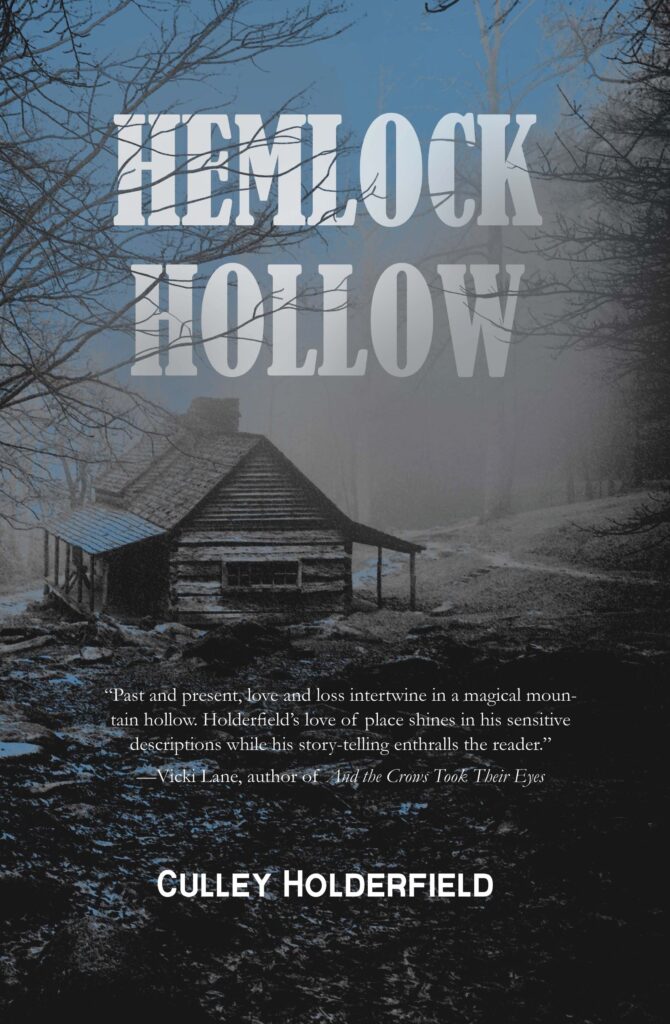Editor’s Note: This exchange is part of a series of brief interviews with emerging writers of recent or forthcoming books. If you enjoyed it, please visit other interviews in the I’ve Got Questions feature.
- What’s the title of your book? Fiction? Nonfiction? Poetry? Who is the publisher and what’s the publication date?
Hemlock Hollow
Fiction
Regal House Publishing (December 6, 2022)
- In a couple of sentences, what’s the book about?
When an archaeologist inherits a cabin in an Appalachian hollow, she discovers a boy’s journal that lures her into the depths of a century-old murder and forces her to face down a past she has long tried to escape.
- What’s the book’s genre (for fiction and nonfiction) or primary style (for poetry)?
Historical mystery, Southern fiction
- What’s the nicest thing anyone has said about the book so far?
That’s a hard question. One reviewer compared it to The Color Purple, and others have compared it to Barbara Kingsolver’s work. A comparison to either would be astonishing and overstated, but to be compared to both really makes my day because Alice Walker and Barbara Kingsolver are two of my absolute favorite writers.
- What book or books is yours comparable to or a cross between? [Is your book like Moby Dick or maybe it’s more like Frankenstein meets Peter Pan?]
It’s a historical novel set in the mountains of North Carolina, rife with secrets and family history with a dual-timeline braided narrative that takes the reader on a journey of discovery. For some, it might evoke Sharyn McCrumb’s The Unquiet Grave or Lee Smith’s On Agate Hill. One reader described it as Cold Mountain meets Fried Green Tomatoes.
- Why this book? Why now?
Hemlock Hollow was inspired by a cabin in Henderson County that my parents bought in the 1970s that became the setting of my childhood summers. I was fascinated by the prior occupants of the place and set out to figure out who they were and what kinds of lives they led. Eventually, that research would lead me to write this novel. I worked on it off and on for years, revising, rinsing, repeating. Seven or eight drafts later, I finally got it where I wanted it. Writing this novel was my own journey into the past and is my own way of making sense of my relationship to a specific place that influenced my life profoundly.
- Other than writing this book, what’s the best job you’ve ever had?
I’ve been lucky to have a day job that compensates me for doing challenging, meaningful work in the world. I’ve worked for 20 years at a community development credit union in Durham, NC and have loved it. But the best job I’ve ever had has to be the job I worked in college when I was at UNC-Chapel Hill, which was cataloging incoming materials in the Southern Historical Collection. Getting to work firsthand with historical documents was eye-opening and provided a more intimate relationship with history than any textbook. For example, I got to handle (very carefully) the correspondence of Marion Butler, agrarian reformer and architect of the Fusionist government in North Carolina and, later, the college transcripts of Senator Sam Ervin of Watergate fame. I made less than $4 per hour there, but I wouldn’t trade that experience for all the money in the world. That job gave me the skills I’ve used in researching this and other novels.
- What do you want readers to take away from the book?
Primarily I hope they derive some enjoyment from reading it. Beyond that, I hope that maybe it causes readers to reflect on their own relationships with special places in their lives, whether those are of the natural world or human-made.
- What food and/or music do you associate with the book?
Food for consumption appears in the book, but it isn’t central to the theme or plot.
But the production of food is quite important. Carson’s father owns a grist mill, and Carson spends many hours tending to it, feeding hominy and corn into the hopper, bagging up cornmeal and grits, helping to troubleshoot breakdowns. It’s there that he learns the value of hard work and absorbs his father’s stoic expectations.
The Quinn family also lives close to the old Drovers’ Road that passed through the Hickory Nut Gap (now US Hwy 74), which would team with livestock after harvest season as farmers drove their hogs, cattle, turkeys, and hens from the mountains to markets to the south and east. At the time of Carson Quinn’s journal in the 1880s, both milling hominy and driving livestock are becoming things of the past. Industrialization has begun to change people’s relationship to the land and food, and that’s one of the tensions in the novel. Of course, there’s also moonshine, also rife with tension, should you consider it food.
As for music, it’s present in the background, from the plaintive yearning of ballads like Lorena in Carson’s era to the raucous chords of Slayer in Caroline’s time, with a bit of fiddling and banjo playing in between.
- What book(s) are you reading currently?
Less than a month ago, North Carolina lost a treasure when Philip Gerard passed away unexpectedly. He chronicled North Carolina history both with his fiction and non-fiction, including his novel about the 1898 Wilmington coup entitled Cape Fear Rising. Right now, I’m reading his Civil War history of North Carolina published by UNC press called The Last Battleground.
In fiction, I’m reading Scott Blackburn’s novel It Dies with You, a gritty Southern noir set in the North Carolina Triad region, another novel about family secrets unearthed unexpectedly.
Learn more about Culley on his website.
Follow him on Twitter and Instagram.
Buy the book from the publisher (Regal House Publishing) or Bookshop.org.


